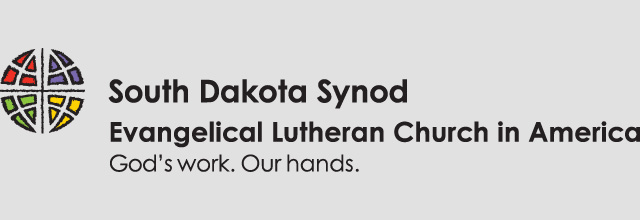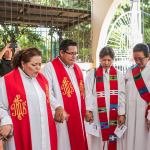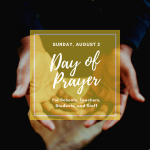Dear Church, Siblings in Christ of the South Dakota Synod,
Grace and peace to you, in the name of God the Father, and the Son, and the Holy Spirit! It has been a while since you last heard from me. Therefore, I like to pick up where I left off, and that is the fact that the pandemic has altered our life in more ways than one.
Since the middle of March, I describe the time we live in as the Ice Age, and I continue to uphold this understanding of these pandemic times until scientists and medical experts have discovered and developed an effective and proven cure or vaccine for Covid-19. Then, and only then, will I consider the Ice Age to be over. But make no mistake, dear church, when I say “then and only then” do I consider the Ice Age to be over, I am not talking about going back to normal, but entering into yet another phase: the phase of living into, and leaning into, what it means to be church after a pandemic. But more to that when that time arrives. Until then, we will need to get acquainted with living our life during the Coronavirus pandemic.
As we are challenged to live and lean into the reality of being church during pandemic times, we have lots of questions and concerns. How will the faith communities of the South Dakota Synod be a witness to Christ’s call to love God and neighbor during these challenging times of uncertainty?
I come to you today to share what guides me as your Bishop in this time. I do this because I am called to care for all people and congregations of the South Dakota Synod and provide leadership and spiritual guidance. Following the example of our Lord, Jesus Christ, who involved his disciples and the wider community into leadership, and following our denomination’s polity, I value and uplift shared leadership. Carrying out Christ’s call to love God and neighbor can only be lived out in a committed community and through shared leadership. Because we share leadership, we also share in the discernment and decision-making process. I call the discernment process lovingly “holy wrestling.” I am committed to “holy wrestling” with the people and congregations of the SD Synod, because it puts flesh around the bones of our faith. It allows us as God’s people in SD and congregations across the synod to live out loud what we believe. Not to boast, but to publicly act upon our shared faith values to love God and neighbor. It’s our baptismal calling, which we all share, lay and rostered members of the same body, the body of Christ, called to bear witness to Christ’s gift of new life.
That particular gift, the gift of new life, is what shapes and inspires us to be bold in our proclamation but even bolder in our way of life. That gift, the gift of new life, is what makes us God’s people, dear church! New life sprouts when holy and safe spaces are created to wrestle with the hard. Hard as in “whether to move worship services back indoors or not” or hard as in “what will it be like if we do that?” or hard as in “will we require everyone to wear masks or not?” or hard as in “we are of different opinion about things, but we are committed to each other, not because we like each other, but because we see and understand each other as beloved child of God, being church together.” Being church doesn’t settle for polarization, where we settle for agreeing to stay in our own corner and point fingers at each other. Being a strong and resilient church is that, in spite of our differences, we continue the conversation, not for the sake of conversation, but for the sake that God’s power of reconciliation, love, grace and mercy shine. I need you to understand that I firmly uphold the opinion that we can only be as strong of a church as we are trusting the promise that God will use our circumstances and us to bring about his kingdom come, and that in spite of our flaws and brokenness he trusts us enough to be church together. Dear Church, every single one of us is a part of God’s church and we can only be strong together. And we all need to do our part.
When you elected me last year in June to lead this synod into the future, I said that I hadn’t immigrated to the US, leaving everything I hold near and dear, such as family and a nation that had raised and shaped me, dark history and all, to play church. I didn’t know about Covid19, but I knew that we will need to change how we are church. The pandemic is serious and I need you to take it seriously. I dare to say that the church in the US has never faced a more serious matter than this pandemic that requires our members all working together for the sake of the common good and to live what we confess that God is Lord of all and will provide.
And that is true for all expressions of the church, congregations, synods, and churchwide. We need to stand together so that God’s light shines and brings hope during this challenging time. There is no room for us versus them. That’s exactly why we need you! So, what can you do? Well, let’s stick with the scientific facts. We trust science when it comes to determining when a human heart begins to beat. We trust science to determine that smoking causes cancer and secondhand smoke causes cancer. Therefore, we made laws to protect our neighbor from harm. The Coronavirus is the coronavirus. That, dear church, is a scientific fact, and I am not about to debate that. It is also scientifically proven that it bears a threat to our health of which we cannot see a clear outcome, since research and evaluation is still in its beginning stages. Therefore, the only thing we can control is us. Let us give thanks for researchers, scientists, nurses, doctors and all medical personnel, who tirelessly care for the sick and those developing a cure and or vaccine. In spite of the imminent danger, you keep showing up! Thank you! Let us give thanks for a healthcare system that is one of the best in the world. But let us also stop and stand with the almost 140.000 fathers, mothers, brothers, sisters, spouses, aunts, uncles, friends and co-workers who have died in the US. These people are not just statistics, but human beings with breath and heartbeat. God’s good creation, fearfully and wonderfully made in the image of God. God entrusted us into each other’s care.
So far the only known preventive measure to slow down the virus and allow research and evaluation to work on a cure and vaccine is to limit unnecessary in person contact. Dear Church, I know and understand that you miss coming together in person for worship. Allow me to let you in on a professional secret, I love in person worship, so do your rostered ministers and SAMs. Each and every pastor, deacon and SAM has given their life to God and public service in God’s name. And an essential piece of each of these leaders’ life and being is the desire to worship in Spirit and Truth. But worship and being the church does not depend on the building. Worship in Spirit and Truth depends on everyone’s trust that while we change the location of our worship, we have not ceased to be church and show up as such. God’s not in a building, in all truthfulness, God left the building a long time ago. God is on the loose in the world, and as much as we try to catch him and put him back in the building, we will not be able to do it. The time has come and gone. It is time to trust that there will be new life for the church in new and innovative ways beyond the Covid wilderness.
Let’s take a look at God’s people at the time of the Exodus. Worship as slaves in Egypt looked much different for a long 400 years than it did when the Israelites worshiped in the wilderness for 40 years. And then once again upon entering the promised land, eager to build a temple, it took approximately another 400 some years, before the temple opened for worship. Do the math, dear church, that took some patience, resilience, detouring, endurance and revisioning of how God’s people thought about worship and most importantly did worship in Spirit and truth. But in the midst of all that shifting of worship pattern, God’s people showed up knowing that God would show up as well to see them through this major event in human history.
Was it easy? Was it comfortable? Did they want to go back a time or two to how things were? Did they bicker? Did Moses pull his hair out, argue with God and went to bed, wondering? Looking at scripture, I would say that that is a fair statement. The Exodus, the journey through the wilderness, the conquering of the promised land and establishing of one of the largest kingdoms known to all humankind came at a cost and at a high price, not just for the Israelites, but for all those who they encountered. Covid 19 comes at a price. It’s painful, no doubt. It’s uncomfortable. It requires us to rethink our old ways and reevaluate. It requires us to soul search and reexamine what and who our trust is placed in. These are the hard conversations we need to lean into and we need to have. Are we placing our trust into the family pew or the living God?
I have heard that asking people to mask or not to sing, to physical distance and to not refrain from returning to a building is an infringement on their personal freedoms. I would argue with Martin Luther, the Reformer, that “A Christian is a perfectly free lord of all, subject to none. A Christian is a perfectly dutiful servant of all, subject to all.” Observing and practicing these known and effective measures surrounding keeping your neighbor safe is not an infringement of personal freedoms, but a bold witness of our shared Lutheran heritage and faith to love God and neighbor above all.
Yes, especially for our vulnerable rural communities, where the building is still the social center of our lives, where bare survival hinges on every one’s showing up and doing their part, where membership declines and new growth happens only in the fields and life stock lots, where internet connection is spotty and no positive Covid case has been reported as of yet being the church in a digital community or a new way is unimaginable. That’s why it is even more important that we all do our part and share the call of being church together in new and supportive ways, by networking available resources and using them. Shaming and bullying, polarizing and quitting are not a reflection of our baptismal understanding that we are all forgiven forgivers, broken people in need of God’s mercy, loved by the one and the same God who loves every one of us in the same way. The ground beneath the cross is level, but so is God’s love. He doesn’t love me more than you, but he also doesn’t love you more than me. And to your neighbor, you are Jesus.
The pandemic has clearly shown us how vulnerable and interdependent humankind is and how each one of us benefits from the care of others. It has also brought to our attention how we can make a difference if we stand together and that everyone truly counts. The pandemic might make us feel helpless as we try to fight off something we cannot see. We may feel overwhelmed by the uncertainty of “how long yet?” and seek comfort in the thought that if we go back to what we know everything will be okay. We grieve so many living losses that at times it feels unbearable. I know how difficult and painful this is first hand. My family is still needing to bury my mother-in-law in Germany who died this past April. Along with other deceased she is shelved in a funeral home waiting for us to arrive to bury her and lay her to rest. But because this world has come to find out how interconnected we all are, travel restrictions are put in place to keep others safe, and my family does and will continue to do their part. Because even though I long to bury her, I know that God already holds her in the palms of his hands, and that the funeral is for my healing as hers has already taken place. As much as I want a traditional funeral, there won’t be one in the near future, I live with the comfort that the Lord is my shepherd and that I shall not be in want, and that he guides me besides quiet waters and that even though I walk through the valley of the shadow of death I do not fear.
Dear church, let’s show up, by admitting that we are vulnerable, and sit for a bit with Job and Jonah, Jeremiah and all the other prophets in this uncomfortableness of admitting that we don’t have all the answers, that we long to go back to what was and that we are not quite sure about this new thing God is about to do. Yes, this being community in fellowship will be different than Sunday morning coffee hour, where our hardest decision is whether we take a chocolate chip or a peanut butter cookie, or both. This type of church fellowship shows up expecting to do the hard, knowing that in the end it’s not about us, but about God and neighbor. Therefore, let’s stay flexible and communicate with each other. In uncertain times, we are called to be flexible and adaptive in how we live our lives and how we lead.
The situation isn’t static; therefore, we will need to reevaluate continually what best practices look like to live our faith in community. We are people that walk wet, meaning we are people that live fueled by our baptismal promises and calling, to trust that God cares for his beloved creation and that trust empowers and inspires us to live life without fear that closed church buildings will be the death of God’s church.
In closing people have asked me about my recommendation. In short, I do not recommend going back to buildings until a cure or vaccine has been found and proven to work. But what I recommend is some serious visioning and reimagining of how we are church that loves God and neighbor above else. What I recommend is that we explore brave new ways of being church together. I also understand that not returning to your beloved church home may not work for you or in your context. If that is the case, I recommend that you use the synod’s contactless worship and put all known to be effective safety measures in place to flatten the curve. I give thanks for your faith, your partnership in the Gospel and ask God to strengthen us for service in Christ’s name.
Amen!



